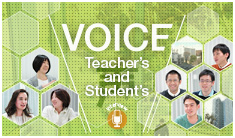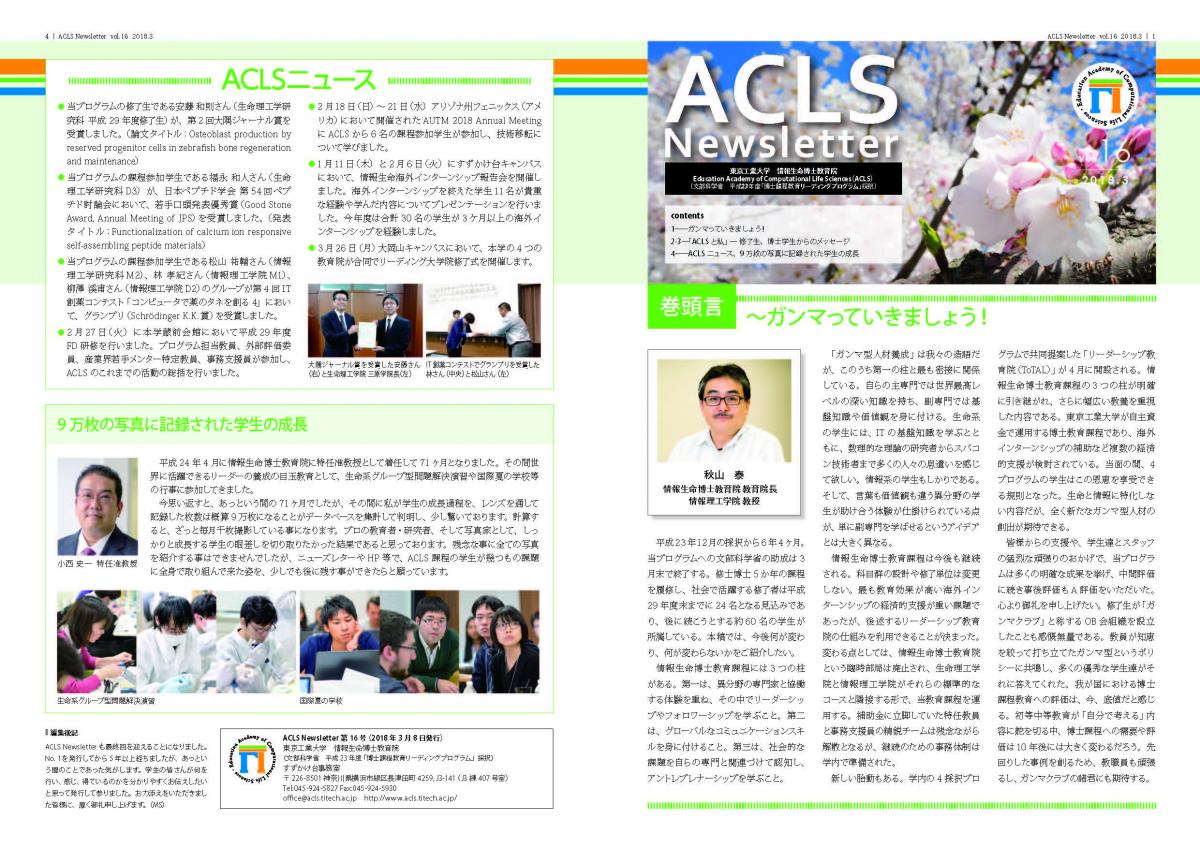- Home
- Teacher's and Student's voice
- Hiroyuki Ogata
Hiroyuki Ogata


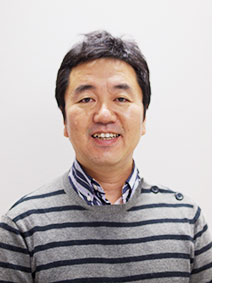
[ACLS enrolled at the time]
Ogata:I have always been involved in bioinformatics research. After obtaining my PhD in Japan, I moved to France. From 1999, I spent for 13 and a half years as researcher at CNRS (see Note 1). My main research theme was the analysis of microbial genomes.
For a variety of reasons, I felt the desire to return to Japan and work in my native country. Since I had worked as a researcher in France, I wanted to be involved in university education in Japan. My desire was to become an educational professional so that I could convey my experience and knowledge to students. At that time, I learned that my mentor Professor Akiyama (Professor Yutaka Akiyama, Director of ACLS) was recruiting new ACLS staff. ACLS would give me the opportunity to educate students while continuing my own research. I felt that such work would be extremely fulfilling, and decided to apply.
However, to be honest, I initially lacked a clear understanding of the ACLS program and didn't feel any special appeal! Upon listening to an explanation before assuming my position, I got the impression that the organization was somewhat intangible and unorganized—please excuse my poor choice of words. However, my impression changed drastically upon actually entering ACLS. I now realize that there is an extremely detailed plan that elicits the unique appeal of this leading program. Beginning with my appointment as a specially-appointed associate professor in November 2012, I also had worked to elicit the merits of ACLS.
Note 1:CNRS (Centre national de la recherche scientifique; French National Centre for Scientific Research) is a fundamental research institution based throughout France. As the largest research center in France, it employs a staff of approximately 30,000.

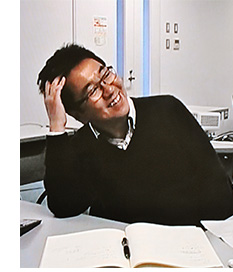
[Live video during interview]
Ogata:Firstly, the program is extremely well run in an overall sense. As I stated previously, ACLS features a detailed curriculum. The program also plans many meaningful events for students. Moreover, instructors and students cooperate to form a motivated and capable group that moves forward while maintaining a sense of purpose. I strongly felt a sense of awareness for working together towards a common goal.
Regarding the curriculum, the appeal of ACLS is found in the richness and breadth of study. For example, allow me to discuss my specialty of bioinformatics. Research in this field started to thrive in the 1990s. At that time, the main research theme focused on analysis of human genomes and other related genomes. In that respect, research was conducted on a narrow subject. However, conditions are must different today. Analysis of human genomes no longer focuses on a single individual; instead, analysis is performed for the genomes of several people. Today, the scale and quality of data used in bioinformatics has changed significantly. Consequently, there have also been great changes in analysis methods such as data mining and image processing. A feature of ACLS is that its curriculum accurately reflects the current state of changing conditions. Students are able to study diverse fields which will expand their perspective. Bioinformatics is no longer the narrow field that it was in the past; instead, ACLS gives students the opportunity to experience and study a variety of fields through a true connection of life science and information science.
Furthermore, through classes such as Creative Collaboration Works, ACLS presents students with the chance to solve problems while cooperating with people from other fields. There is also a program to cultivate global communication ability, such as in the Science and Technology Communication Subjects. I believe that ACLS allows graduate students to cultivate abilities which they will need in the future.

Ogata:Of course, there are some researchers who are successful even though they lack high-level communication skills. However, this is just a small portion of all researchers. Today, graduate schools are expected to cultivate professionals who will be useful in various aspects of society. Whether you start your own business or work in the industrial sector, communication skills are essential for succeeding in society. ACLS is a program that develops such skills through actual practice.
Personally, I teach students the importance of communication skills based on my experience overseas. I was able to produce significant research results by cooperating with other people instead of working alone. So, what is important when working as a group to solve problems? The answer is to skillfully interact with others and create a network. I understand this from actual experience.
Each person has an inherently different level of communication ability. However, there are aspects of communication ability which can be improved through experience. For example, when working as a group to solve problems, it is important to choose the appropriate timing for stating your own opinion while maintaining cooperation with others. Although maintaining harmony is important, one must never lose sight of the ultimate goal. The Creative Collaboration Works offered at ACLS provides students with an opportunity to accumulate such experience.
Of course, forming a group does not guarantee that problems will be solved. On the contrary, many problems are solved alone. Even so, it is vital to share problems and think from a variety of different perspectives. I hope to cultivate students who will heighten their own abilities in order to offer unique skills that no other group member possesses. These abilities and skills form the basis for great success when participating in a group.
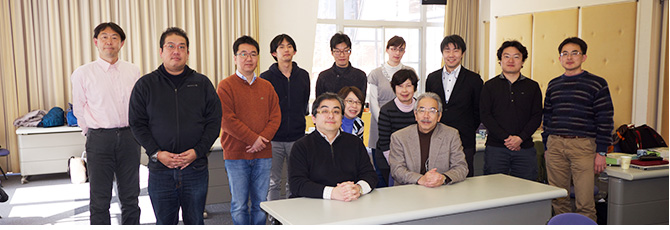
[Third from the left in the FD training group photo]

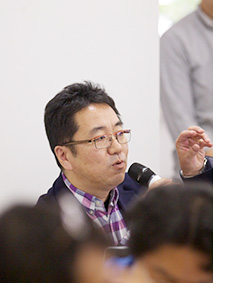
[At Summer School 2013]
Ogata:I was in charge of the 2nd Summer School (see Note 2). This event was based on the premise of "practical cultivation of useful ability in students through planning and implementation conducted by students." Without a doubt, students will encounter similar situations—for example, holding meetings and events—again in the future. The summer school is based on the concept of enabling students to gain experience at university and learn the steps involved in event-planning.
Therefore, the policy of "leadership by students" was established from the very start. As much as possible, we wanted students to make decisions and take action by themselves. There is also the merit of cultivating group communication ability through meetings of the event committee.
Of course, students encountered many difficulties when actually attempting to implement the event. Not much progress was made at the weekly meetings and students sometimes seemed perplexed. However, at such times, faculty members refrained from making strong recommendations, instead giving gentle advice. I believe that this attitude allowed for significant growth by students participating in the even committee.
It was the first time that Summer School was held overseas (the 1st Summer School was held at Shonan Village Center in Kanagawa Prefecture), so we encountered administrative difficulties. Right up until the event was held, the event committee continued to exchange emails with local contacts in an effort to prepare. Issue included status of the venue, whether the required equipment had been prepared, time spent moving between locations…there were so many details to work out. Of course, there may be small mistakes; but we wanted to realize an overall level of high quality that would satisfy all participants.
Despite the administrative difficulties encountered in planning, many of the participating students said that the event was great. Undoubtedly, there was great meaning to have an opportunity to travel overseas and use English to give presentations and interact with others.
Note 2:2nd Summer School: Held at Imperial College London (UK) from September 9th to 13th, 2013. Through group discussions and poster sessions, the event aimed to encourage interaction between people of different cultures and fields of expertise. More than 80 people participated in the school, including ACLS students, other students from overseas and guest lecturers.

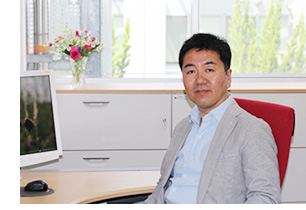
[At Kyoto University]
Ogata:ACLS teaches students skills essential for becoming a "Γ (gamma) type specialist." In order to become a "global professional"−someone who travels to many places and cooperates with people to realize great success−, you must first refine your ability in your field of expertise. Then, you must acquire the skill to communicate with a wide variety of people. Rather than focusing solely on academics, ACLS teaches students techniques for branching out in multiple directions, similar to the line extending out from the top of the Γ symbol. Personally, I don't believe that understanding multiple academic fields is of significant importance. Instead, I believe it is best to strive for deep knowledge in a single field, while being able to set a common goal by effectively sharing and understanding knowledge exchanged with others. At ACLS, students learn methods and gain experience in fostering such qualities. I hope that people with a broad perspective will join ACLS.
Today, scientific technology has advanced and there are limitless opportunities to conduct research using large amounts of diverse data. The junction of biology and information offers numerous fields which will challenge students interested in biology, those interested in medicine, and those who hope to contribute to society through information processing. I hope that students will seize the opportunity for growth at ACLS.
ACLS offers a detailed program and the opportunity to work closely with a variety of instructors. English language education and practice in Creative Collaboration Works will most certainly be of use in the future. I urge students to take advantage of this outstanding program.
※ The contents of this article are accurate as of the time the interview was conducted in January 2015.






